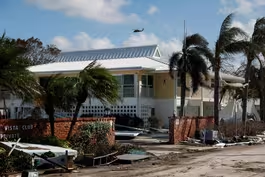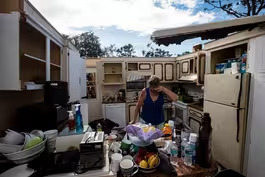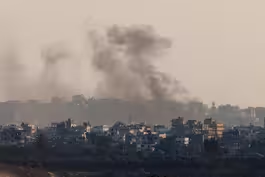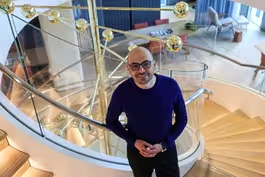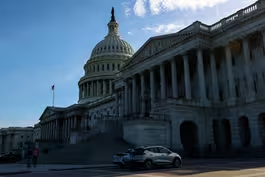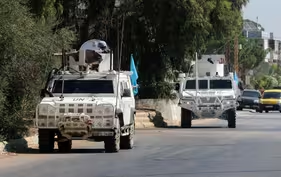
Israel's goals for Lebanon and how the U.S. is responding
Clip: 10/10/2024 | 4m 11sVideo has Closed Captions
What are Israel's goals for its campaign in Lebanon and how the U.S. is responding
As attacks between Israel and Hezbollah escalate, Nick Schifrin reports on how the U.S. is responding to Israel's campaign in Lebanon and what Israel's goals are.
Problems playing video? | Closed Captioning Feedback
Problems playing video? | Closed Captioning Feedback
Major corporate funding for the PBS News Hour is provided by BDO, BNSF, Consumer Cellular, American Cruise Lines, and Raymond James. Funding for the PBS NewsHour Weekend is provided by...

Israel's goals for Lebanon and how the U.S. is responding
Clip: 10/10/2024 | 4m 11sVideo has Closed Captions
As attacks between Israel and Hezbollah escalate, Nick Schifrin reports on how the U.S. is responding to Israel's campaign in Lebanon and what Israel's goals are.
Problems playing video? | Closed Captioning Feedback
How to Watch PBS News Hour
PBS News Hour is available to stream on pbs.org and the free PBS App, available on iPhone, Apple TV, Android TV, Android smartphones, Amazon Fire TV, Amazon Fire Tablet, Roku, Samsung Smart TV, and Vizio.
Providing Support for PBS.org
Learn Moreabout PBS online sponsorshipGEOFF BENNETT: And to discuss how the U.S. is responding to Israel's campaign in Lebanon and what Israel's goals are, let's bring in Nick Schifrin, who just returned from a trip to Israel.
It's great to have you back at the desk here.
So, Nick, what does Israel say it's trying to achieve?
NICK SCHIFRIN: Israel says it's trying to bring back some 60,000-plus residents who have been displaced from the north since October the 8th.
That's the day that Hezbollah opened fire in what it said was solidarity with Hamas after the October 7 attacks.
And to achieve that, Israel says it has to move Hezbollah forces back, Hezbollah special forces known as the Radwan, back a couple miles from the border at the very least.
And Israeli officials say that's where that political solution that Leila was just talking about, 1701, which requires Hezbollah to remove its forces behind the Litani River, which is on average about 16 or 17 miles from the border.
Now, other Israeli officials say that this is an opportunity to do something bigger.
Leila has been pointing out this week that Benjamin Netanyahu, the prime minister, told Lebanese people to -- quote -- "take their country back."
That suggests a political weakening of Hezbollah that some Israeli officials are after.
And we have seen an expanding of the Israeli military operation, airstrikes that are massive along the border, creating that kind of huge devastation that you see there.
The Israeli military has called for evacuations for a quarter of the country, including areas way north of the Litani River.
And that's led some of the U.S. administration to be concerned about mission creep and what has been described by Israel as a limited operation to actually expand quite beyond that.
Geoff, Israel invaded Lebanon in 1982, describing it as a -- quote -- "military operation."
It took them 18 years to leave.
GEOFF BENNETT: So where does all of this leave U.S. policy?
NICK SCHIFRIN: U.S. officials are worried about that mission creep.
And they're worried, to the video that we just saw, about those airstrikes.
Matt Miller, the State Department spokesman, said yesterday that Israel -- that Southern Lebanon, sorry, could not turn into the situation in Gaza.
But U.S. officials across multiple agencies acknowledged to me that they have changed their priority when it comes to Lebanon.
Just two weeks ago, Secretary of State Antony Blinken said this about how Israel must choose diplomacy over war.
ANTONY BLINKEN, U.S. Secretary of State: One is the path of diplomacy, getting a cease-fire along the border between Israel and Lebanon, one that allows people from both countries to safely return to their homes.
The other path leads to conflict.
The United States has made clear, along with the G7, the European Union, partners in the Gulf, so many other regions, that we believe the way forward is through diplomacy, not conflict.
NICK SCHIFRIN: But then Israel killed Hassan Nasrallah, the secretary-general of Hezbollah, and U.S. officials decided this was an opportunity, an opportunity to weaken Hezbollah in Lebanon and to weaken Iran's axis across the region.
And that is why you got a shift, essentially a support of a limited military operation, underline limited, military operation into Southern Lebanon.
And you get the language that you got from Matt Miller, the State Department spokesman, yesterday, talking about degrading Hezbollah militarily and politically.
MATTHEW MILLER, State Department Spokesman: We ultimately want to get to a diplomatic resolution.
The situation on the ground has changed from where we are two weeks ago.
And we hope that this change in situation the ground will change Hezbollah's calculation, ultimately.
We hope that Hezbollah has degraded enough that they are less of a force in Lebanese politics and that they agree to withdraw back up above the Litani River, so 1701 can be implemented.
NICK SCHIFRIN: Part of the U.S. effort will be, Geoff, to get Lebanon's parties to elect a new president.
They have not done that since late 2022.
But, again, there remains that concern about mission creep.
Whether Israel sticks to the plan of a limited operation, which the U.S. describes as proximity to the border, really remains to be seen.
GEOFF BENNETT: Nick Schifrin, thanks, as always.
NICK SCHIFRIN: Thank you.
Art and science collide in enormous project
Video has Closed Captions
Clip: 10/10/2024 | 7m 40s | Art and science collide in enormous project at dozens of museums and galleries (7m 40s)
FEMA official details response strategy after 2 hurricanes
Video has Closed Captions
Clip: 10/10/2024 | 4m 30s | FEMA official details federal response strategy after 2 major hurricanes (4m 30s)
Florida officials assess damage after Hurricane Milton
Video has Closed Captions
Clip: 10/10/2024 | 7m 58s | Florida officials assess damage after Hurricane Milton leaves path of destruction (7m 58s)
News Wrap: Israeli strike on Gaza shelter kills 27
Video has Closed Captions
Clip: 10/10/2024 | 6m 20s | News Wrap: Israeli strike on school sheltering displaced people in Gaza kills 27 (6m 20s)
Nobel winner on how his work could transform lives
Video has Closed Captions
Clip: 10/10/2024 | 6m 9s | Winner of Nobel Prize in chemistry describes how his work could transform lives (6m 9s)
These key races could determine control of the U.S. Senate
Video has Closed Captions
Clip: 10/10/2024 | 6m 34s | These key races could determine control of the U.S. Senate (6m 34s)
Trump pitches tax incentives as Harris appeals to new voters
Video has Closed Captions
Clip: 10/10/2024 | 2m 8s | Trump pitches new tax incentives in Detroit as Harris pushes to reach voters in new places (2m 8s)
U.N. accuses Israel of firing on peacekeepers in Lebanon
Video has Closed Captions
Clip: 10/10/2024 | 5m 39s | U.N. accuses Israel of firing on its peacekeepers in southern Lebanon (5m 39s)
Providing Support for PBS.org
Learn Moreabout PBS online sponsorship
- News and Public Affairs

FRONTLINE is investigative journalism that questions, explains and changes our world.

- News and Public Affairs

Amanpour and Company features conversations with leaders and decision makers.












Support for PBS provided by:
Major corporate funding for the PBS News Hour is provided by BDO, BNSF, Consumer Cellular, American Cruise Lines, and Raymond James. Funding for the PBS NewsHour Weekend is provided by...

